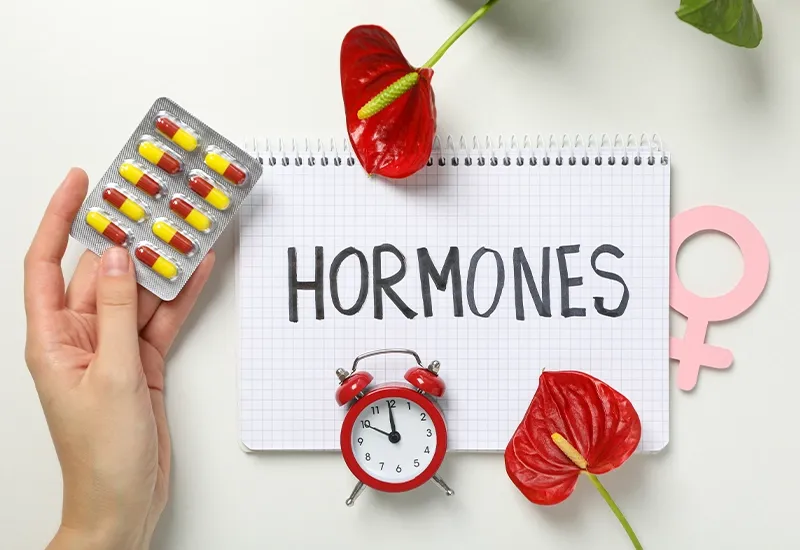Understanding Hormonal and Reproductive Disorders in Men and Women

by Dr. W. Rizvi
29 Oct 2025

Hormonal and Reproductive Disorders in Men and Women refer to medical conditions that occur when the body’s natural balance of hormones is disrupted, affecting metabolic functions, growth, mood, and fertility. These disorders can impact both male hormonal health and female hormonal health, leading to physical symptoms, emotional changes, and challenges in reproductive function. Understanding these imbalances is crucial for early detection, proper management, and maintaining long-term hormonal and reproductive health in both men and women.

Lifestyle and Preventive Approaches
While not all hormonal disorders can be prevented, adopting a healthy lifestyle greatly reduces the risk. Balanced nutrition, adequate sleep, regular physical activity, and stress management techniques like yoga or meditation promote stable hormone function. Avoiding processed foods, reducing sugar intake, and limiting exposure to chemicals found in plastics and pesticides also support hormonal and reproductive health.
For women, regular gynecological check-ups are vital for detecting reproductive issues early, while men benefit from routine hormone evaluations, especially as they age. Prioritizing these preventive steps ensures better long-term health outcomes.
Causes of Hormonal and Reproductive Disorders
The causes of male and female hormonal imbalances vary widely and can include genetic, lifestyle, and environmental factors. Stress, poor diet, lack of sleep, and exposure to endocrine-disrupting chemicals are among the leading triggers. Chronic conditions such as obesity, diabetes, and autoimmune diseases also play a role in disturbing hormonal balance.
FAQS
How are hormonal and reproductive disorders diagnosed?
Physicians detect imbalances through blood tests, hormone panels, imaging, and physical exams. In women, ultrasound can identify conditions like PCOS or endometriosis, while semen analysis in men helps assess fertility challenges.
What treatment options are available for hormonal disorders?
Treatment depends on the cause. Lifestyle changes like improved diet, stress management, and regular exercise can restore hormonal health, while medications may regulate thyroid, insulin, or sex hormone levels.
When is hormone replacement therapy (HRT) needed?
HRT may be recommended for patients with significant hormonal imbalances affecting male or female hormonal health, helping restore proper hormone levels and improve overall well-being.
Are fertility treatments necessary for reproductive disorders?
Yes, some patients may require fertility treatments to address male or female reproductive health issues. In complex cases, surgical interventions may also be considered.
The Connection Between Hormonal Disorders and Overall Health
Hormonal disorders and reproductive disorders do not exist in isolation. Because hormones regulate so many body systems, an imbalance in one area often leads to broader health consequences. For example, untreated thyroid disorders can cause cardiovascular problems, weight gain, and impaired mental focus. Similarly, reproductive health issues such as PCOS are closely linked to insulin resistance, which increases the risk of developing type 2 diabetes.
In men, low testosterone not only affects fertility but also raises the likelihood of osteoporosis, reduced muscle strength, and even metabolic syndrome. Women experiencing hormonal imbalances during menopause may face an increased risk of heart disease and bone density loss. This demonstrates how closely hormonal health is tied to long-term wellness.
While both genders can experience hormonal disorders, the symptoms and conditions often differ due to variations in biological makeup.
In women, common hormonal imbalances include polycystic ovary syndrome (PCOS), thyroid disorders, and menopause-related hormone changes. PCOS, for instance, is characterized by irregular menstrual cycles, weight gain, and excessive hair growth due to higher levels of androgens. Thyroid conditions such as hypothyroidism or hyperthyroidism can cause fatigue, mood changes, and irregular menstruation.
In men, low testosterone (hypogonadism) is one of the most prevalent hormonal issues, leading to reduced libido, fatigue, muscle loss, and sometimes infertility. Men can also experience thyroid imbalances, which affect energy levels, metabolism, and mood.
Both men and women may also face adrenal disorders such as Cushing’s syndrome or Addison’s disease, which influence cortisol production and impact stress response, blood pressure, and immune function.
Reproductive Disorders Linked to Hormonal Health
Reproductive health is closely tied to hormonal balance. Disruptions in hormone levels can directly influence fertility, menstrual cycles, and sexual function.
In women, reproductive disorders such as endometriosis, infertility, and irregular ovulation often stem from hormonal imbalances. For example, insufficient progesterone can prevent proper implantation of a fertilized egg, making pregnancy difficult. Menstrual irregularities are often an early sign of underlying hormonal health problems.
In men, reproductive disorders may include erectile dysfunction, low sperm count, or reduced sperm motility. These problems are often connected to testosterone deficiency or pituitary gland dysfunction. Because the male reproductive system relies on a precise balance of testosterone and other hormones, even small disruptions can affect fertility.
In women, age-related changes such as menopause naturally shift hormone levels, but lifestyle factors can intensify symptoms. Similarly, in men, testosterone levels gradually decline with age, but certain medical conditions can accelerate the decline. Recognizing these risk factors is the first step toward maintaining hormonal health and preventing long-term reproductive complications.
Symptoms of Hormonal and Reproductive Disorders
The symptoms of hormonal disorders can be subtle or severe, depending on the extent of imbalance. Fatigue, weight fluctuations, mood swings, sleep disturbances, and changes in appetite are common early signs. Women may experience irregular or heavy periods, hot flashes, or infertility, while men may notice decreased libido, hair loss, or reduced muscle strength.
When these symptoms are ignored, they can progress into more serious reproductive disorders, including infertility, erectile dysfunction, or chronic pelvic pain. Because these conditions overlap with other medical issues, professional evaluation is crucial.
Treatment depends on the underlying cause. For some patients, lifestyle changes such as improved diet, stress reduction, and regular exercise can restore hormonal health. Others may require hormone replacement therapy (HRT), fertility treatments, or medications that regulate thyroid, insulin, or sex hormone levels. In complex cases, surgical intervention may be necessary.


"Restoring hormonal balance means reclaiming energy, fertility, and confidence at every stage of life."
Emotional and Psychological Impact
It’s important to note that male and female hormonal imbalances not only affect the body but also the mind. Mood swings, anxiety, and depression are common in individuals with hormonal disorders. The psychological burden of infertility or chronic reproductive issues can also lead to emotional distress and relationship challenges. Seeking counseling or joining support groups can provide valuable coping strategies alongside medical treatment.
Conclusion
Understanding hormonal disorders and reproductive disorders is the first step toward better health. Both men and women can experience hormonal imbalances that affect fertility, energy, mood, and long-term well-being. With proper diagnosis, timely treatment, and lifestyle adjustments, it is possible to restore balance and improve overall hormonal and reproductive health.
Resource:
Share This:
Disclaimer
*Please note that the information provided in the blogs and articles is intended for general informational purposes only and should not be considered medical advice. We strive to bring you the latest information about the endocrine world; however, we encourage you to seek individual medical advice and treatment options during your consultation with a qualified healthcare professional. *
